牛津译林版英语九年级上 Unit 4 Growing up Welcome 课件(共18张PPT)
文档属性
| 名称 | 牛津译林版英语九年级上 Unit 4 Growing up Welcome 课件(共18张PPT) | 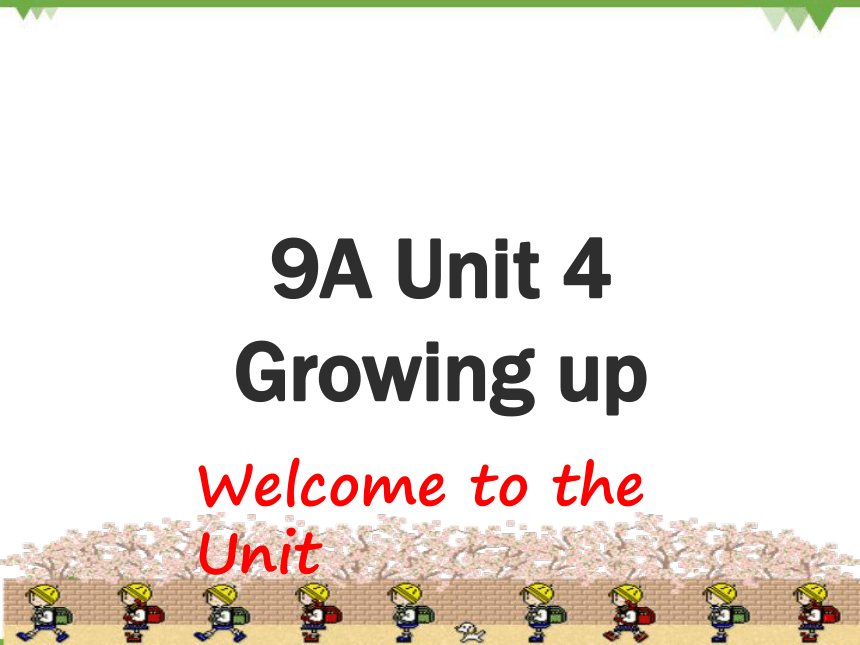 | |
| 格式 | ppt | ||
| 文件大小 | 1.9MB | ||
| 资源类型 | 教案 | ||
| 版本资源 | 牛津译林版 | ||
| 科目 | 英语 | ||
| 更新时间 | 2021-12-05 09:49:25 | ||
图片预览

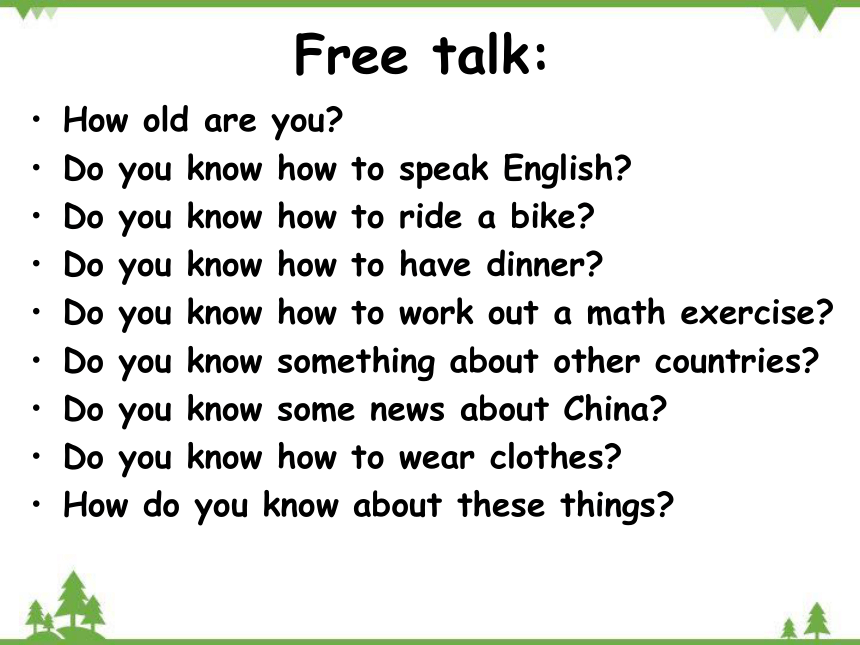
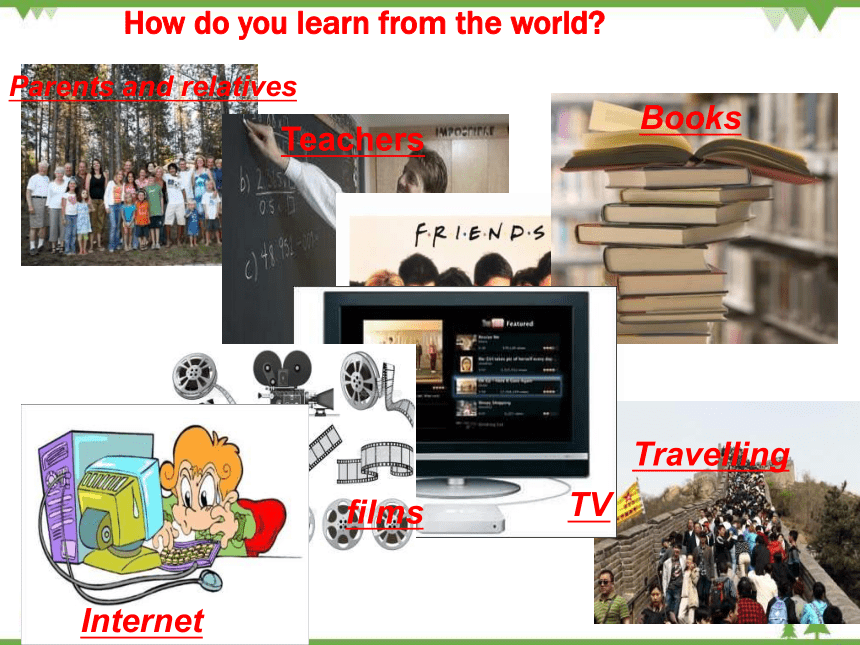

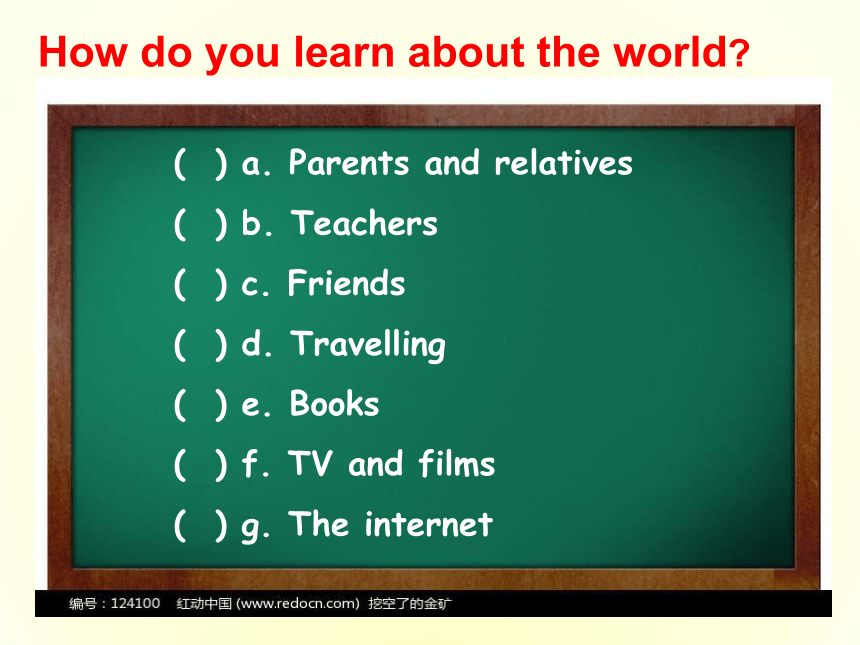
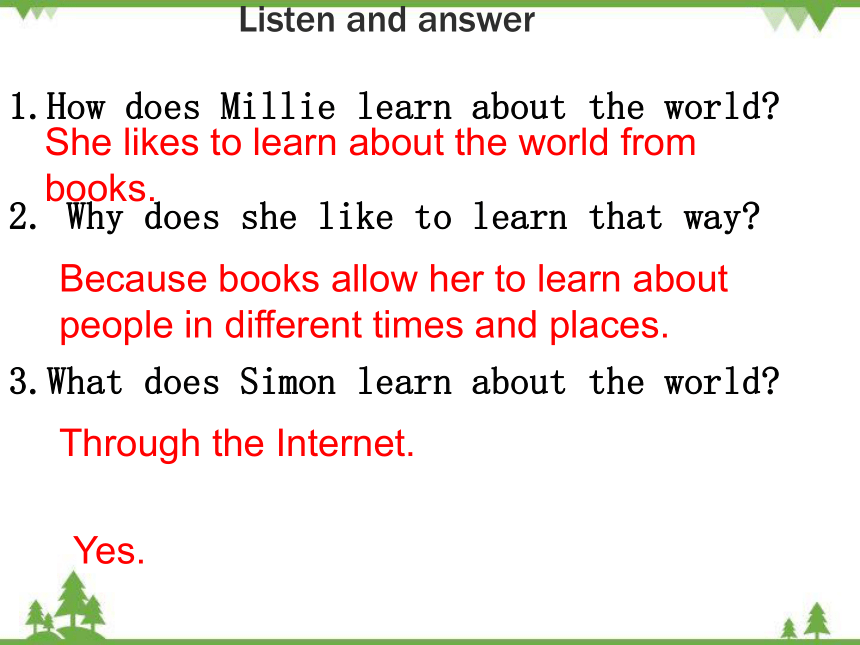
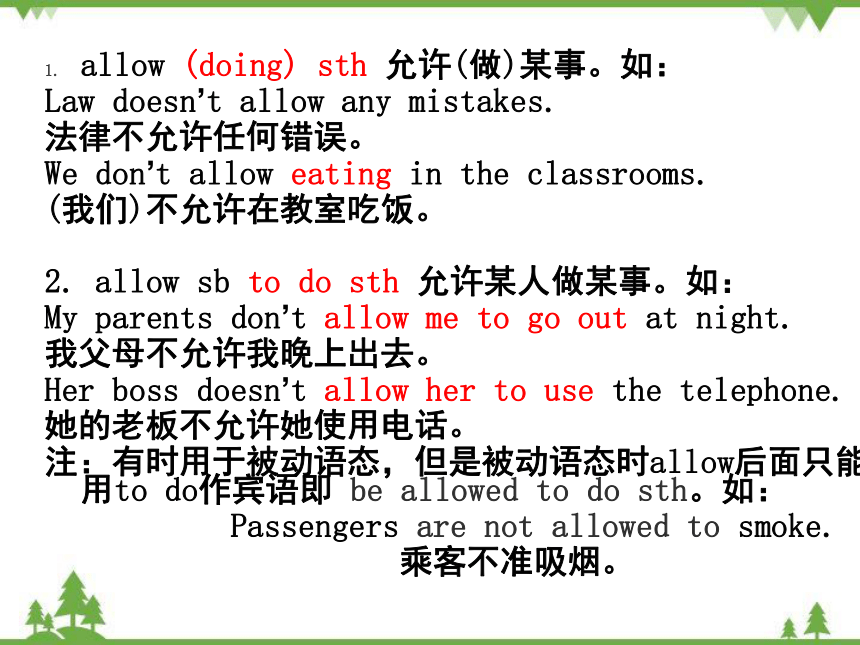
文档简介
(共18张PPT)
9A Unit 4
Growing up
Welcome to the Unit
How old are you
Do you know how to speak English
Do you know how to ride a bike
Do you know how to have dinner
Do you know how to work out a math exercise
Do you know something about other countries
Do you know some news about China
Do you know how to wear clothes
How do you know about these things
Free talk:
How do you learn from the world
Parents and relatives
Teachers
Travelling
Books
TV
films
Internet
in different times
don’t allow me to play games
don’t understand me
learn something through the Internet
As soon as you click the mouse,
there is a great deal of
information.
know what is on my mind
How do you learn about the world
( ) a. Parents and relatives
( ) b. Teachers
( ) c. Friends
( ) d. Travelling
( ) e. Books
( ) f. TV and films
( ) g. The internet
Listen and answer
1.How does Millie learn about the world
2. Why does she like to learn that way
3.What does Simon learn about the world
She likes to learn about the world from books.
Because books allow her to learn about people in different times and places.
Through the Internet.
Yes.
allow (doing) sth 允许(做)某事。如:
Law doesn’t allow any mistakes.
法律不允许任何错误。
We don’t allow eating in the classrooms.
(我们)不允许在教室吃饭。
2. allow sb to do sth 允许某人做某事。如:
My parents don’t allow me to go out at night.
我父母不允许我晚上出去。
Her boss doesn’t allow her to use the telephone.
她的老板不允许她使用电话。
注:有时用于被动语态,但是被动语态时allow后面只能用to do作宾语即 be allowed to do sth。如:
Passengers are not allowed to smoke.
乘客不准吸烟。
time
可数名词表示“次数” “时代”
不可数名词表示“时间”
区别:
sometime some time
some times sometimes
某个时候
一些时间
几次
有时
Through的用法
1. 作介词 从…中通过(强调丛物体内部或一定范围内)
On our way we had to pass through forest.
The sunlight was coming in through the window.
辨析:through ,across ,over
(1)The Great Wall winds its way _______ deserts.
(2)Go _____the bridge ____ the river, and you will find the shop.
2 通过,凭借(方法手段),经由
He became rich through hard work and ability.
We learn to speak through speaking.
3 由于,因为…的关系
He failed through lack of experience.
4 自始至终;从头到尾/底
We worked through the night.
through & by 表示“通过”时,区别:
1. through 后常加名词表示手段媒介
He became rich through hard work.
He bought the book through a friend.
2. by 后常加工具具体名词以及-ing 形式
(1)表示以一般的方法或方式。如: No one in those days could live by writing poems.
(2)表示传达、传递的方式或媒介。如: How did you send the letter, by airmail or by ordinary mail
He got that job _____ his uncle.
You can succeed _____ working hard.
I sent the letter______ airmail.
as soon as引导时间状语从句
1.主句一般将来时,从句用一般现在时代替一般将来时
如:I will tell him the news as soon as he comes back。
2. 指紧接着发生的两个短动作,主从句都用一般过去时
如 He took out his English books as soon as he sat down.
翻译:
I’ll write you as soon as I get there.
我一到那儿就给你来信。
As soon as I went in, Katherine cried out with pleasure.
我一进门,Katherine 就高兴的叫起来。
I’ll return the book as soon as I read it.
我一读完就把书还回去。
1. a great deal of+不可数名词表示“大量的”
He has given me a great deal of help.
他给了我很多帮助。
2. a great deal用在形容词或副词的比较级前,表示“大量;许多”
如: We learned a great deal from them.
我们从他们那里学到很多东西。
He ran a great deal faster than I.
他跑得比我快多了。
英语中有很多短语表示“大量;许多”,根据性质可分为以下三类:
★ 修饰可数名词的有:a large / great number of谓语动词用复数形式。如:
★ 修饰不可数名词的有:a large amount of/a great deal of等,谓语动词用单数形式。如:
He has spent a large amount of money on his new house.
他在新房子上花费了许多钱。
★ 既能修饰可数名词,又能修饰不可数名词的有:a lot of, lots of, 等,谓语动词根据被修饰的名词是可数还是不可数来决定单复数形式。如:
There are a lot of / lots of people in that room.
那个房间里有许多人。
There’s a lot of / lots of rice in the bag.
那只口袋里有许多大米。
Make up a dialogue:
A: How do you learn about the world
B: ...
A: Why do you like to learn that way
B: ...
What about you
A: ...
B: Is that so
A: ..
Listen and read:
What is on Eddie’s mind
How can Eddie solve the problem
on one’s mind(名词)挂念在心上
He looks as if he has something on his mind. 他仿佛有什么心事似的。
其他常见用法: make up one’s mind to do sth
mind(动词介意) doing sth.
I:根据句意及首字母或汉语提示完成句子
1.We must try our best_________(无论什么) we do.
2.You can’t leave your son by h_______ at home.
3.The loss of the money has been a weight on my m_____.
II:根据汉语意思完成句子
1.不论发生什么事,我都不会改变心意。
__________ happens, I won’t change my mind.
2.每个人登机前都要通过安检。
Everyone must go______ the security check before boarding the plane.
3.学英语最好的方法是尽可能地多说。
The best way to learn English is to speak it as_______ as_______.
whatever
imself
ind
Whatever
through
much
possible
4.我一到杭州就给你打电话。
I will call you as_____ as I______ in Hangzhou.
5.他给了我很多帮助。
He has given me__ _____ ____ _____ help.
6.那只袋子里有许多大米。
There_____ a lot of rice in the bag.
那个房间里有许多人。
There_____ lots of people in that room.
soon
arrive
a great deal of
is
are
9A Unit 4
Growing up
Welcome to the Unit
How old are you
Do you know how to speak English
Do you know how to ride a bike
Do you know how to have dinner
Do you know how to work out a math exercise
Do you know something about other countries
Do you know some news about China
Do you know how to wear clothes
How do you know about these things
Free talk:
How do you learn from the world
Parents and relatives
Teachers
Travelling
Books
TV
films
Internet
in different times
don’t allow me to play games
don’t understand me
learn something through the Internet
As soon as you click the mouse,
there is a great deal of
information.
know what is on my mind
How do you learn about the world
( ) a. Parents and relatives
( ) b. Teachers
( ) c. Friends
( ) d. Travelling
( ) e. Books
( ) f. TV and films
( ) g. The internet
Listen and answer
1.How does Millie learn about the world
2. Why does she like to learn that way
3.What does Simon learn about the world
She likes to learn about the world from books.
Because books allow her to learn about people in different times and places.
Through the Internet.
Yes.
allow (doing) sth 允许(做)某事。如:
Law doesn’t allow any mistakes.
法律不允许任何错误。
We don’t allow eating in the classrooms.
(我们)不允许在教室吃饭。
2. allow sb to do sth 允许某人做某事。如:
My parents don’t allow me to go out at night.
我父母不允许我晚上出去。
Her boss doesn’t allow her to use the telephone.
她的老板不允许她使用电话。
注:有时用于被动语态,但是被动语态时allow后面只能用to do作宾语即 be allowed to do sth。如:
Passengers are not allowed to smoke.
乘客不准吸烟。
time
可数名词表示“次数” “时代”
不可数名词表示“时间”
区别:
sometime some time
some times sometimes
某个时候
一些时间
几次
有时
Through的用法
1. 作介词 从…中通过(强调丛物体内部或一定范围内)
On our way we had to pass through forest.
The sunlight was coming in through the window.
辨析:through ,across ,over
(1)The Great Wall winds its way _______ deserts.
(2)Go _____the bridge ____ the river, and you will find the shop.
2 通过,凭借(方法手段),经由
He became rich through hard work and ability.
We learn to speak through speaking.
3 由于,因为…的关系
He failed through lack of experience.
4 自始至终;从头到尾/底
We worked through the night.
through & by 表示“通过”时,区别:
1. through 后常加名词表示手段媒介
He became rich through hard work.
He bought the book through a friend.
2. by 后常加工具具体名词以及-ing 形式
(1)表示以一般的方法或方式。如: No one in those days could live by writing poems.
(2)表示传达、传递的方式或媒介。如: How did you send the letter, by airmail or by ordinary mail
He got that job _____ his uncle.
You can succeed _____ working hard.
I sent the letter______ airmail.
as soon as引导时间状语从句
1.主句一般将来时,从句用一般现在时代替一般将来时
如:I will tell him the news as soon as he comes back。
2. 指紧接着发生的两个短动作,主从句都用一般过去时
如 He took out his English books as soon as he sat down.
翻译:
I’ll write you as soon as I get there.
我一到那儿就给你来信。
As soon as I went in, Katherine cried out with pleasure.
我一进门,Katherine 就高兴的叫起来。
I’ll return the book as soon as I read it.
我一读完就把书还回去。
1. a great deal of+不可数名词表示“大量的”
He has given me a great deal of help.
他给了我很多帮助。
2. a great deal用在形容词或副词的比较级前,表示“大量;许多”
如: We learned a great deal from them.
我们从他们那里学到很多东西。
He ran a great deal faster than I.
他跑得比我快多了。
英语中有很多短语表示“大量;许多”,根据性质可分为以下三类:
★ 修饰可数名词的有:a large / great number of谓语动词用复数形式。如:
★ 修饰不可数名词的有:a large amount of/a great deal of等,谓语动词用单数形式。如:
He has spent a large amount of money on his new house.
他在新房子上花费了许多钱。
★ 既能修饰可数名词,又能修饰不可数名词的有:a lot of, lots of, 等,谓语动词根据被修饰的名词是可数还是不可数来决定单复数形式。如:
There are a lot of / lots of people in that room.
那个房间里有许多人。
There’s a lot of / lots of rice in the bag.
那只口袋里有许多大米。
Make up a dialogue:
A: How do you learn about the world
B: ...
A: Why do you like to learn that way
B: ...
What about you
A: ...
B: Is that so
A: ..
Listen and read:
What is on Eddie’s mind
How can Eddie solve the problem
on one’s mind(名词)挂念在心上
He looks as if he has something on his mind. 他仿佛有什么心事似的。
其他常见用法: make up one’s mind to do sth
mind(动词介意) doing sth.
I:根据句意及首字母或汉语提示完成句子
1.We must try our best_________(无论什么) we do.
2.You can’t leave your son by h_______ at home.
3.The loss of the money has been a weight on my m_____.
II:根据汉语意思完成句子
1.不论发生什么事,我都不会改变心意。
__________ happens, I won’t change my mind.
2.每个人登机前都要通过安检。
Everyone must go______ the security check before boarding the plane.
3.学英语最好的方法是尽可能地多说。
The best way to learn English is to speak it as_______ as_______.
whatever
imself
ind
Whatever
through
much
possible
4.我一到杭州就给你打电话。
I will call you as_____ as I______ in Hangzhou.
5.他给了我很多帮助。
He has given me__ _____ ____ _____ help.
6.那只袋子里有许多大米。
There_____ a lot of rice in the bag.
那个房间里有许多人。
There_____ lots of people in that room.
soon
arrive
a great deal of
is
are
